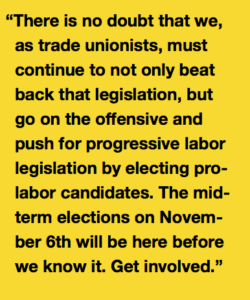NATIONAL VICE PRESIDENT’S REPORT
Missouri Victory Validates Labor’s Effectiveness in the Political Arena
The recent statewide labor victory in Missouri is the latest example of the collective power of union members. In 2017, Missouri’s Republican controlled legislature passed a so-called right-to-work law. Legislators who voted for this unfair and unjust legislation were the kind that professed the “No Free Lunch” philosophy.
As trade unionists, we all know that is exactly what right-to-work laws do. They allow members to opt out of paying union dues, while still enjoying the benefits attained through the collective bargaining agreement and daily union representation.
The requirement to join the union was born out of the collective bargaining process. Politicians who rail against regulation, and for civil liberties, always make an exception when it comes to labor unions and the working class. Labor unions are more heavily regulated than any organization or industry, and right-to-work laws are simply another form of legislation designed to severely weaken, if not destroy, labor unions.
Voters know what’s right
These self-described champions of democracy that support and promote right-to-work laws are actually destroying democracy within labor unions. A simple majority is all that is needed to form a union. But under right-to-work laws, the minority is not required to go along with the majority and can continue to enjoy the benefits of the union without paying for it. These workers are commonly known as free riders.
 In other areas of our society the majority sets the agenda for all. A good example of that would be a referendum on a new school tax. If the majority votes for the new tax, the minority must pay the tax, regardless of whether or not they have children in the school system. In the case of right-to-work, though, people can opt out of paying for union services yet they will continue to receive those services. Try using the facilities at the country clubs of right-to-work supporters without paying dues and see what happens.
In other areas of our society the majority sets the agenda for all. A good example of that would be a referendum on a new school tax. If the majority votes for the new tax, the minority must pay the tax, regardless of whether or not they have children in the school system. In the case of right-to-work, though, people can opt out of paying for union services yet they will continue to receive those services. Try using the facilities at the country clubs of right-to-work supporters without paying dues and see what happens.
In cases where the passage of right-to-work laws by state legislators is put on a statewide ballot initiative for final approval by the people, voters, once armed with the facts, will do what’s right for themselves and the state by rejecting that corporate legislation. Missouri is the latest state in which the people overrode the will of the legislature by rejecting the 2017 right-to-work legislation. As in all labor victories, it was not won without a lot of hard work by union members.
The fight began with a coordinated campaign through the Missouri AFL-CIO and its Central Labor Councils and affiliated members. Union members gathered approximately 300,000 signatures to bring it to a statewide vote.
Prop A defeated 2-to-1
The AFL-CIO has estimated that union members, including our members, knocked on about half a million doors. When the polls closed on Election Day, August 7, Proposition A was defeated by a two-to-one margin, a landslide by any measure, making Missouri the first state to overturn a right-to-work law.
The 2011 ballot initiative in Ohio, which repealed Senate Bill 5, was another major victory for workers.
Unfortunately, when right-to-work was passed in Michigan, the legislature denied Michiganders the right to repeal that legislation via referendum by including it in an appropriations bill. In other words, Michigan legislators intentionally thwarted the rights of their own constituents. That is exactly why ballot initiatives were created. Also known as direct democracy, dating back to the Progressive Era spanning from the 1890’s to the 1920’s, ballot initiatives were put in place to counter industrialists’ control over state legislatures. Now, in the 21st century, we see history repeating itself.
Corporate America is up to its neck in the political process and will continue to support vicious anti-union legislation. There is no doubt that we, as trade unionists, must continue to not only beat back that legislation, but go on the offensive and push for progressive labor legislation by electing pro-labor candidates. The mid-term elections on November 6th will be here before we know it. Get involved. Work for pro-labor candidates. For more information on what you can do, contact your State AFL-CIO.

